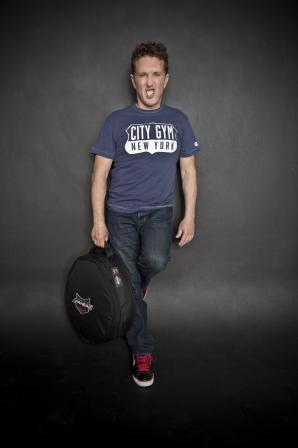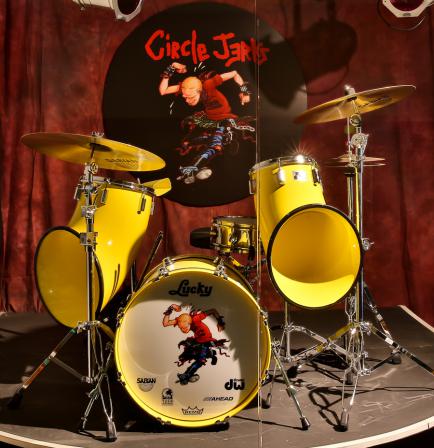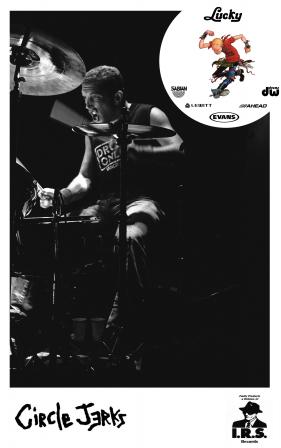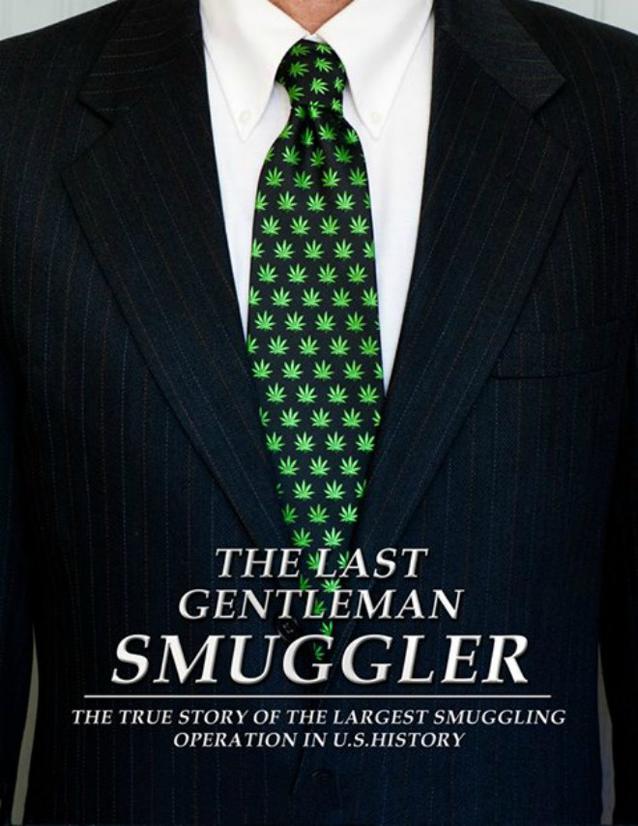In preparing for the celebration of Punk Globe’s 41st Anniversary, I decided to talk with Lucky Lehrer who is the well-known father of hardcore drumming. In the interview. Lucky talks about the first years with Circle Jerks, his jazz background, playing with Darby Crash of The Germs and his his current band #Goals. Hope you all will enjoy!
Punk Globe: Hardcore as a revolutionary musical direction was followed with a number of changes. There is experiments with guitar chords, songs' duration. In fact, you've seen hardcore since its very first days. So talking about your playing – what helped you to put the right accents in right places ?
Lucky: There was no guidebook. Things emerged from attitudes expressed by early bands like the Sex Pistols and Ramones. L.A. Hardcore took things a step further, providing a soundtrack for skateboarders, an inspiration for extreme athletes who were trashing on X-treme bicycles, surfing between pier pilings and doing tricks on snowboards. It was all about taking things to the max (including partying), making manic music that magnified both madness and machismo.

Punk Globe: Let's talk about “Group Sex” as one of the first hardcore albums, I’ve always been pretty fucking confused by the length of the record. But alas – it’s what we call nowadays “a great record”. Only 15 minutes long. Tell us, what memories that you have of working on the album ?
Lucky: We were young as a band and created songs exuding urgency. There was no time for long guitar solos or extended jams. Twelve-second songs like “Deny Everything” express snippets and warnings like if you get busted, keep your mouth shut. Our songs make a point and move on.
No legitimate record company would put us in a studio. Among the so-called “hip” record companies, there was a corporate ban against punk. That’s not different from the way, years later, they tried to shut down rap. My friend traded 24 hours of studio time for a pound of marijuana. It was a dingy studio on the backlot of a movie studio run by a bunch of hippies. These hippies were happy with all the pot and women that tagged along, but they worried we’d slam dance on their 16-track mixing board. We didn’t have money for anything, so we recorded over used tape, something that’s never done, but gives “Group Sex” an amazing, grainy sound.
The hippy engineers had never heard of punk. I brought my friend Cliff Zelman in to do mixing. By the time we got to “Live Fast, Die Young,” we liked the way things were starting to sound. That encouraged us to invent songs like “Group Sex” on the spot. The girls jumped in as back-up singers. Keith read an ad from a porno magazine. I gave out my phone number. It felt more like a drunken sauna than a recording session. Later, people would call me from all over the world looking for the sex party. We laughed a lot and had fun.
What propelled the album to be memorable was sheer enthusiasm…a magical day in time. In spite of the garage-like surroundings, we were excited anybody would want to record us. You hear the exuberance in every song.
Punk Globe: As a drummer, you were influenced mainly by jazz music. Did you think of punk rock as a kind of “limited” musical style? All songs are very short, and there is no such solos like “Moby Dick” in punk itself.
Lucky: A lot of the early punk scene was an effort to differentiate. The twin dragons of disco and progressive music were the antagonists. Punks sought to dress and act differently than people who listened to the Mahavishnu Orchestra. If Carl Palmer of ELP played a 15 minute solo on a kit with 20 drums, then I’ll play a five-second drum fill with four just drums. We wanted to be the opposite of things we thought were lame.
That doesn’t mean we hated everything that proceeded punk. Each of us were musically knowledgeable in our own way. I loved John Bonham (drummer of Led Zeppelin) but I was also a huge fan of legendary jazz drummer Buddy Rich. In Buddy’s big swing band, you here the speed and ferocity I sought to import.
Another huge influence on me was Keith Moon of The Who. Moon was a psychotic lunatic who never held back. He reminded me of a professional wrestler; An oversize personality who would drive a Rolls Royce into a swimming pool. He never played the same thing twice. I played like the Keith Moon of hardcore punk with the fast fill flourishes of Buddy Rich. With great drummers like Spit Stix (Fear), Don Bonebreak (X), Alan Stiritz (L.A.’s Wasted Youth) and others on the scene, I had plenty of inspiration.

Punk Globe: There are lots of urban legends about your tours and gigs. I have heard a lot of the wild stories about your shows myself. Did you want to shock the audience or make them astonished ?
Lucky: I hate it when you go to concerts, the band comes out and they start standing around and tuning up. We agreed on a different approach. We would drink, smoke and do whatever till it was time to come out. From the moment we left backstage till we started playing was three seconds. If you were out of tune or the drums weren’t set up properly, just deal with it! The audience is waiting…then in an instant bright lights go up and we’re ripping into “World Up My Ass” at 250 kilometers an hour,180 beats per minute.
Whether performing live or when the needle hits the turntable, the idea is to grab by the throat. We’re throwing ice water on your face as you’re fighting in the desert sun. The audience is instantly energized, shock waves reverberate back to the band causing us to push harder. The energy is multiplied, exchanged back and forth between the band and the crowd. In that sense, the audience is a key part of the band. This made our live shows unforgettable and explosive. People climbing on 14-foot speaker columns and swan diving off, landing either atop the crowd, face planting on the cement floor or convalescing at the nearest hospital. No music before or since has engendered as an incendiary a level of pandemonium.
Punk Globe: Of all of the Circle Jerks albums, only “Wild In The Streets” has such a number of cover-versions. Was it that you wanted to show kids that all these artists also could be fast and aggressive or was it your way of paying respect to theses artists?
Lucky: Like “Group Sex,” a lot of our songs were about two or three minutes. We humorously threw in a couple of cover songs.
Punk Globe: I have to ask you about your work with the Darby Crash Band. As far as I know, Darby already started to move away from the classic punk rock. I know you and Darby had a difficult relationship. How did both of you find a common ground ?
Lucky: We had a complicated relationship. I was sort of a dick. I went to high school with Darby and Pat and I thought Pat was the genius [Editor’s note: Pat Smear is now in Foo Fighters]. In defense, my friend Doug lived around the corner from where actress Sharon Tate and her baby were butchered. The “Manson murders” were random, bloody and terrifying. And here’s this high school nut who dresses like David Bowie, takes acid every day and worships Charles Manson. So in high school, I thought Darby was a loser and I guess the feeling was mutual. Darby was probably surprised when I showed in a new band called the Circle Jerks at a popular music venue in Chinatown, the Hong Kong Café. But he was mainly interested repeating his famous mantra to anyone: “Can I have a sip of your beer?” Eventually, we let our high school animosity go and warmed up enough to play together.
Punk Globe: Talking about your gigs. There were not many of them. But do you remember your last show ?
Lucky: I remember the last show, but it sucked. Things were going poorly. Roger was playing shows in a wheel chair. On one hand, I thought that was funny and totally “punk.” Yet there was tragic pathos that underlid what appeared novel, entertaining and bizarre. It wasn’t like Roger had broken his leg stage diving or anything. Roger couldn’t walk and had tremors as the result of a serious heroin overdose. Later, he died that way and the band was never the same. Keith Morris, by his own admission, was consuming two cases of beer and tons of cocaine. We weren’t making a lot of money. I was in it for the fun and the women. The fun was fading fast.
Punk Globe: As far as I know, you with a few other guys in the Circle Jerks now play in the band #Goals. I remember in one of your interviews you said that Greg Hetson is among your favorite musicians. How it feels to play with your old colleague after all these years ?
Lucky: #Goals is just an example of the fact Greg and I are lifelong friends and love to play music. Right now, we’re in a quandary because there’s plenty of great reasons for the Circle Jerks to back out on tour. For a band that started off playing children’s birthdays for free in front of anyone who would listen, today we’re literally offered six figures to play stadiums in Europe.
Greg and Zander can still rock. I’m playing drums better than ever because I never stopped practicing, taking lessons, giving lessons and playing live. With the drums, there’s no limit to what there is to learn. We tried convincing Keith Morris that he can be in more than one band at the same time. I don’t know if he’s got something against any of the other guys. When I see him, he always acts cool to me. Behind my back, I don’t know if Keith gets some kind of devilish pleasure thwarting fans who write from all over the world and the rest of the band? There’s been offers to just go out and play the Circle Jerks’ songs people want to hear but with a younger singer. Maybe some bad-ass female, our agent suggested? Hmmmm.
So long as Keith is alive, it wouldn’t be the same. But who knows if he’s strong enough to get out there again? When he played with Chuck, Dez and the others as “Flag,” there were three alternating singers and other problems that ensued. Being in the Circle Jerks’ spotlight is more demanding than being a vocalist for the average punk band.
Punk Globe: Tell us more about your background as a drummer. From your biography, I know that you began your career with jazz music. And some of jazz elements you brought to punk rock music. As far as I know you've had several jazz projects. Сan you give the readers more details?
Lucky: I’ve been in jazz bands since high school and all the way through college. Before that, I played what were then called “casuals” (weddings and other affairs). I have a something up on YouTube called “Hardcore Drum Sessions.” Word to drummers: check it out! In various episodes, I point out where rudimental drum exercises appear (Paradiddles, for example, in the song “What’s Your Problem?”), drum corps stuff (“Paid Vacation,” “Question Authority”) and classic jazz idioms like trading 4’s (in “Red Tape.”) Being a good drummer is being a really great listener; You’ve gotta know when to bring it on and when to lay back. To be creative, to surprise and Wow! people is to integrate elements from different genres into your playing.
Punk Globe: Last question for you: The era of hardcore is linked with the end of the ‘70’s – early ‘80’s. When you were totally DIY. Do you miss those days?
Lucky: The old days are now! The Internet makes it possible for everyone to be a music producer. The guys who live across the street from me are in some kind of gangster hip-hop band. They hear me practicing in the living room and know there’s a good chance I have cold beer in the fridge. In spite of being married to a gorgeous woman, they know if they knock and stick a hottie in my face, the doors to my house and refrigerator will fly open. I’m hard-wired that way. I’ll lay down some kind of heavy Zeppelin beat. John Good of DW Drums built me a 26” bass drum the same as Bonham used to play. Like Bonham, the bass drum does not have a hole on the front drum head. The boom! resonates profoundly.
There it is: Kids today free-styling to the deep, dense beat of Kashmir. That’s same kind of world colliding mash up that bore the Circle Jerks’ Latin-inspired favorite “Back Against the Wall” over 30 years ago.



